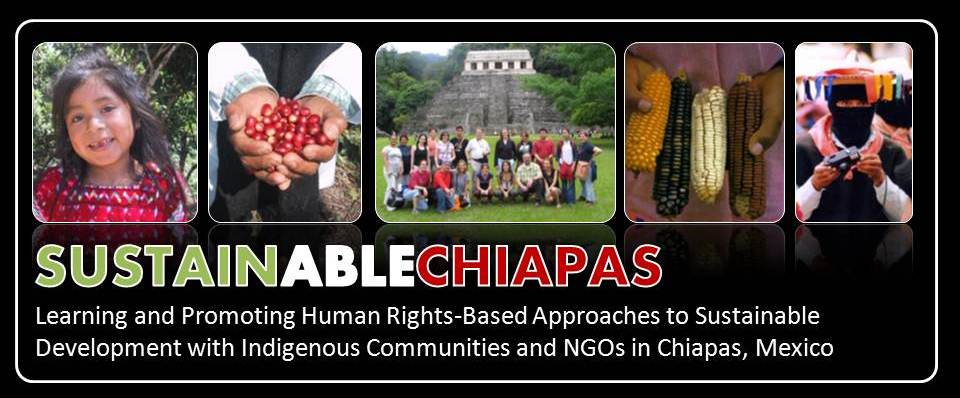Zinacatan: The Land of Bats
When we arrived in Zinacatan, we were met by several Tzotzil women whose small informal business it is to invite tourists to their homes for lunch. We split up in groups of five, and when we arrived at our host’s home, there were huipiles and skirts and other back-strap loom weavings displayed for sale. We sat by the wood fire in their kitchen and ate tortillas with crumbled cheese and egg, and spicy ground roasted pumpkin seed.
We asked the women about their work as weavers and the wages they received. After a cursory calculation, we concluded that they were making approximately $0.15/hour for their labor. This included the material costs of thread, which we were told have doubled in the past two years making their earnings even less. Having worked in the fair trade business with weavers in Guatemala, and from the quantity and diversity of their work, I would venture to say that some of the weavings were also purchased from other women in the community. If that is the case, it would mean even lower wages for the women they purchase from. We asked about the competition in town our host explained with frustration that one family in the community had more or less cornered the tourist market. When large tour busses arrive, tour guides receive a commission for bringing tourists to this family’s home.
The urgency and competition of textile sales is not unique to Zinacatan. I sometimes wonder in this age of mass-produced textile production, with designs mimicking the work of weavers and textile artisans around the world, how their work can be valued fairly for the art and tradition that they represent. I also question if the concept of fair trade is on the radar of many of these women, especially since fair trade is still a predominately northern concept of U.S., Canadian, and European buyers and the relatively small number of “southern producer groups” partnering with them. Many Maya women weave because they can work from home and it is a skill they have mastered and a way for them to earn additional income to contribute to the family economy but what other options exist for the future?
Jolom Mayaenik: Fair Trade Weaving Cooperative:
When we visited Kinal Azentik we learned about the fair trade women’s weaving cooperative Jolom Mayaenik. Their high quality and unique weavings are produced primarily for export and the prices were clearly more than you would find in the market or in Zinacatan. In fact, in doing another rough calculation we determined that the women were making approximately $1/hour. During our lunch, I sat next to Kinal Azentik’s Program Director, Ricardo Iglesias and asked him more about the weaving cooperative. I was impressed by the focus on collective ownership, self-determined development, relationship building, emphasis on political awareness, workshops focusing on themes of indigenous and women’s rights and perspectives, and business capacity building workshops. Jolom Mayaetik incorporates a holistic vision of personal and collective development founded on an indigenous and gender perspective. This struck me as an organization poised for sustainable success because of their focus on continuously challenging their individual and collective potential, their unique and competitive product mix, their network with well established fair trade buyers, and their self-determined leadership model. It is easy, however, to romanticize about an organization like Jolom and in our readings we are reminded that, “the economic profitability of cooperative work has been minimal. The crafts do not make the women who produce them rich, but they do give them the possibility of a certain sense of economic independence, for example, of being able to contribute something to their household.”[1] Aside from being able to earn their own income the non-financial benefits of being a member of Jolom are many. The emphasis on capacity building and leadership training can only lead to more freedom and opportunities within the fair trade marketplace, or in other business ventures, and is promising in building better futures for themselves and their families. Jolom has a “Training Center for Indigenous Women, a physical, social, political, and cultural space where they can reproduce what they have learned, and train themselves in new areas, as well as make new openings for the younger generations that are experiencing important changes in their communities.”[2]
With all of the positive aspects of Jolom, I personally still question how economically sustainable initiatives are that depends primarily on foreign purchases in order to exist. What alternative locally-based economic development opportunities exist for these women?
However, more than the financial benefit, they are finding new spaces where their voices can be heard. I think that Amartya Sen puts it nicely in his book Development as Freedom: “Development has to be more concerned with enhancing the lives we lead and the freedoms we enjoy. Expanding the freedoms that we have reason to value not only makes our lives richer and more unfettered, but also allows us to be fuller social persons, exercising our own volitions and interacting with – and influencing – the world in which we live.”[3]
[1] Castro Apreza, Yolanda. Women of Chiapas. J’pas Joloviletik-Jolom Mayaetik, K’inal Antzetik, An Organizational Experience of Indigenous and Mestiza Women. 216
[2] Castro Apreza, Yolanda. Women of Chiapas. J’pas Joloviletik-Jolom Mayaetik, K’inal Antzetik, An Organizational Experience of Indigenous and Mestiza Women. 214
[3] Sen, Amartya. Development as Freedom. New York, 2000. 14
